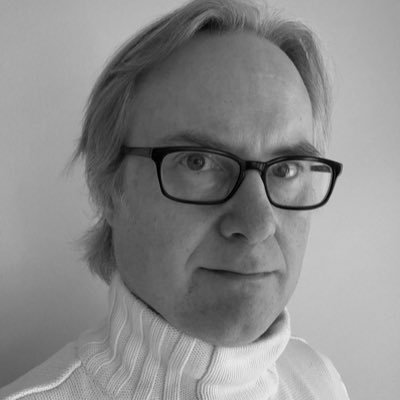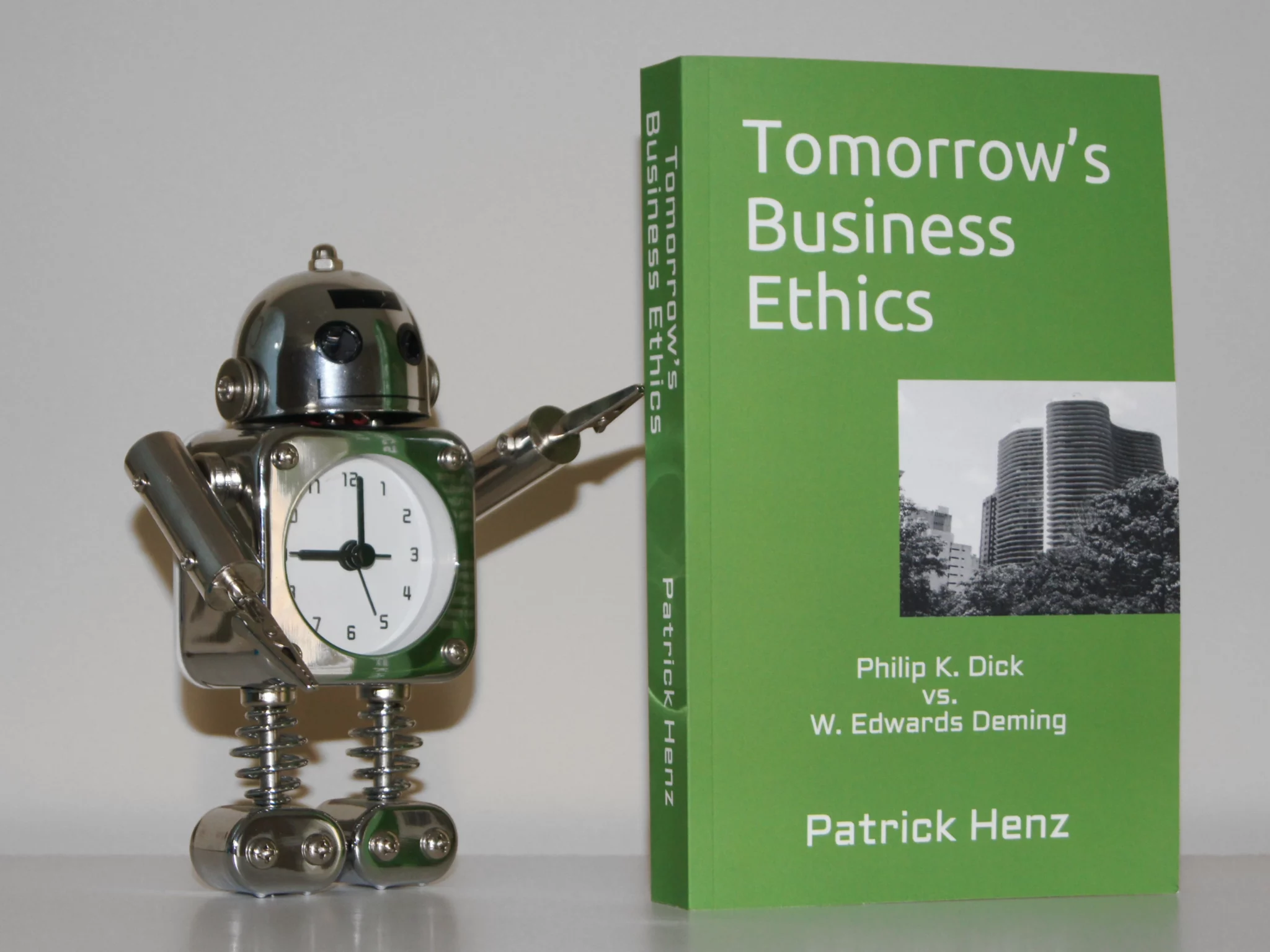Interview by John Wisniewski
AMFM Magazine: Why did you write about W.Edwards Deming Vs. Philip K. Dick? What interested you about the work of both?
Patrick Henz: As science fiction author, Philip K. Dick was less about describing futuristic technology, but more about the human and what makes or keeps us human, especially if placed in unhuman scenarios. If you read his novels and numerous short stories, you understand that many of the described technologies became reality, including the underlying dilemmas. Today, biased algorithms and AI ethics are discussed in society and university, especially when thinking of collaborative robots, prediction, virtual reality, or cognitive digital twins. Fascinating was to confront the author with the scientist W. Edwards Deming, famous for his holistic approach on system-thinking. The “vs.” in the title is a homage to b-movies and computer games. In fact, both align well with each other. Fascinating, if you consider that one comes from pulp fiction and the other from engineering & mathematics. Two different worlds like two sides of the same coin.
AMFM Magazine: .How did the visions of Deming and Dick aid mankind?
Patrick Henz: Both, Deming and Dick, had no general “save-the-world” approach, but focused on playing their part, based on their given and developed skills, to aid mankind. After WW2, Deming went to Japan. First to support the US Government for the Japanese Census, then to help Japanese companies to foster and develop their focus on quality, making them fit for the world market. At the end, for mutual benefit, as the local culture inspired him for his later work. One of his most famous concepts, the “System of Profound Knowledge” underlines the importance of continuous learning and psychology. A vision to keep organizations (could be companies, but also societies) human. Dick (often similar to Kafka) described dystopian scenarios featuring different layers of reality. Not distant visions, but possibilities of a near future. Not to predict tomorrow, but to spark discussions and prevent such negative paths. As child of WW2 and the following cold war, he expressed his fears through his stories. He opened a window to look behind them, instead of repeating a simple “good vs bad”-picture. This explains why his work became relevant not only inside the US, but to readers all over the world and up to today.
AMFM Magazine: What research went into writing the book, W. Edwards Deming vs. Philip K. Dick?
Patrick Henz: Starting point were Philip K. Dick’s novels and short stories, reading and aligning them to today’s developments. At this point, my idea was to write the book just based on PKD. For example, his famous story “Minority Report” is about the accuracy of predictions. Artificial Intelligence and digital twins are all about predictions. Today, police-stations or HR-departments use such technology, often based on biased data and assumptions. In fiction and reality, this may lead to self-fulfilling prophecies. In the process of investigating, the ideas of W. Edwards Deming re-appeared to me, so that I investigated more about him and understood that both men’s ideas connect. Besides primary publications also interviews, and other secondary texts and films had been included. Other inspirations came from traveling and the contact with different people and cultures.
AMFM Magazine: What were Deming and Dick working on before their death? Could you give us a look into what our future may hold for us?
Patrick Henz: Philip K. Dick’s last novel “The Owl in Daylight” stayed unfinished, as the author died the 2nd of March, 1982, around three months before the premier of “Blade Runner”. The movie is based on his earlier novel “Do Androids Dream of Electric Sheep?”, where white owls had been the first species to get extinct. Little is known about the content of his potential last novel, but it might had been a story about humanity’s next step in evolution, aligned with a stronger usage of the left side of the brain, related to science, reasoning and mathematics. Today, we see that humans and AI grow together, as we outsource knowledge up to decision-making to the Cloud, internet, and algorithms. Having the smart phone always right besides us, we practically became cyborgs. In opposite to Dick’s potential idea for his last novel, we tend to fall for the automation bias, meaning not enough logically challenging the information provided by our devices.
It is now more than 35 years later as Dick published his last story, nevertheless his work stayed relevant and part of the actual culture, including sub-culture. He predicted a tendency to monopolies and autocratic governments. In times, where democracies are perceived as being under pressure and populist rulers on the rise, his work not only presents accurate predictions related the technological, but also political and social developments. Reading PKD should motivate us to reflect about life and processes, including to regularly leave our comfort zones to live and stay human.
W. Edwards Deming died the 20th of December 1993. He was active until the end, and it is said that in his last days he was asked how he wanted to be remembered. The professor, statistician and mathematician answered with “as someone who spent his life trying to keep America from committing suicide.” We see again the parallels to Dick.
AMFM Magazine: What is Philip k.Dick’s most visionary novel?
Patrick Henz: His famous novel “Do Android Dream of Electric Sheep?” focuses on the topic of what it takes to be human. Of course, we only have to watch the daily news to understand how relevant this topic is. “Minority Report” anticipated prediction up to neuroprediction. Nevertheless, if asked for Philip K. Dick’s most visionary novel, many will answer “Ubik”. His masterpiece from 1969 about visions and cryogenic technology, keeping recently deceased people in the grey zone between life and death. This scenario enables friends, family, and business partners to contact and interact with them. Today we see the first cognitive and personal digital twins. Such technology keeps for example, artists like Salvatore Dali “alive” as a digital character. Few rich people even created an algorithm or robot based on the data and information from and about their deceased loved ones. Companies may continue working with digital copies of their former employees. Personal Digital Twins will become relevant in the near future, still unclear what the impact on law and society will be.
AMFM Magazine: What diid Deming achieve in the field of Risk Management?
Patrick Henz: As part of his focus on quality, Deming developed the PDSA cycle, also simply known as “Deming cycle”, including the four parts to plan, do, study, and act. A resilient company does not blindly adapt to the actual environment, but predicts and anticipates future changes. This is needed to avoid one of the “Seven Deadly Diseases” (as defined in his book “Out of the Crisis”), the emphasis on short-term profits. To avoid this, companies are required to maximize the long-term value, wherefor it is imperative to identify and address potential risk factors, including negative risks: opportunities.
Aligned with Deming, a risk assessment is a mandatory part of a company’s processes. The PDSA cycle requires that the risk assessment (as part of study) is not only a “once a year”-event, but a continuous process, where new data, information and knowledge change the evaluation and prediction of likelihood and impact.
Thanks to this understanding, the risk assessment is a fundamental part of management, and for example, included into holistic approaches like Governance, Risk & Compliance (GRC).
AMFM Magazine: Was it always clear to readers of Philip K.Dick’s work what he was telling us about the future?
Patrick Henz: Philip K. Dick was part of the late Golden Age of science fiction, a period which slowly started to transform itself into the New Wave. In opposite to earlier authors like Isaac Asimov, PKD did not made his key messages that obvious to discover, but included them into different layers of storylines. Readers may have enjoyed his stories only as “pulp”, or maybe found a deeper meaning. Dick felt often misunderstood, especially in the US. “But then I discovered that in Europe, especially France, science fiction was taken seriously. And the science fiction writer was not regarded on the level of a janitor. And my delight was enormous.” We may assume that many of his contemporaries not understood him. Only today, we may fully appreciate him, also as it seems that we already became one of his visions.
 Patrick Henz started his career in the Corporate Information Office and Compliance at the end of 2007, when he was responsible for the implementation of the Siemens Anti-Corruption system in Mexico and several Central American and Caribbean countries. Together with these tasks, he gained valuable insights into global Compliance programs, with a focus on Latin America. Since 2009, in his role as Compliance Officer he is responsible for an effective Compliance system, based on integrity, respect, passion & sustainability. Coming from a behavioral science background, he analyzed machine behavior, to focus on the Human AI Team and system-thinking.
Patrick Henz started his career in the Corporate Information Office and Compliance at the end of 2007, when he was responsible for the implementation of the Siemens Anti-Corruption system in Mexico and several Central American and Caribbean countries. Together with these tasks, he gained valuable insights into global Compliance programs, with a focus on Latin America. Since 2009, in his role as Compliance Officer he is responsible for an effective Compliance system, based on integrity, respect, passion & sustainability. Coming from a behavioral science background, he analyzed machine behavior, to focus on the Human AI Team and system-thinking.
He actively promotes this idea at university workshops and conferences. Furthermore, he was co-founder of the Ethics & Compliance Forum Mexico, including editor and co-author of the Ethics & Compliance Manual, published in 2014.
Today, Patrick Henz lives and works in the Atlanta area, being responsible for a holistic approach on Governance, Risk & Compliance at a leading engineering and plant construction company, including aligned topics such as Knowledge Transfer, Digital Transformation and Business Continuity Management.
Furthermore, he is committee member of the IEEE Digital Reality Initiative, and author of the books “Tomorrow’s Business Ethics – Philip K. Dick vs. W. Edwards Deming” and “The Good System”.
Position 20 at Thomson Reuter’s US Top 50 Social Influencers in Risk, Compliance and RegTech.

